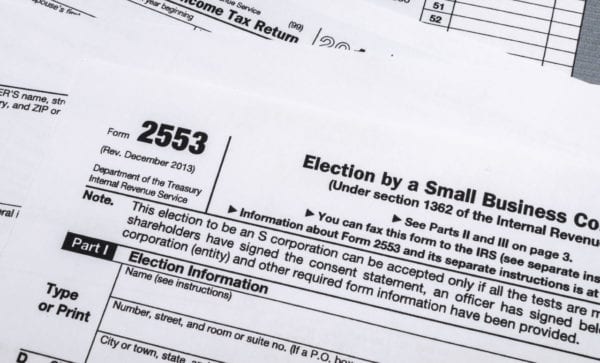The Pennsylvania state motto is “virtue, liberty, and independence”—three words that could also easily describe the traits and values of many small business owners. It makes sense, then, that Pennsylvania is a great place to launch a business, large or small. Don’t just take our word for it.
According to the U.S. Small Business Administration, small businesses provide roughly 30,000 jobs in the Keystone State, employing nearly half of all workers—that’s about 2.4 million people! What’s clear from those statistics is that from Pittsburgh to Philly, Pennsylvania is a state that’s friendly to entrepreneurs.
Despite the fact Pennsylvania is a great place to own and operate a small business just like the one you’ve always dreamed of running, there are certainly no guarantees of success—that’s true no matter where your business is located.

Though an LLC, or limited liability company, is just one of many options founders can choose from, it’s especially well-suited to the needs of most small businesses, providing the protection and support these enterprises need to survive. Give your Pennsylvania startup the best chance of success while limiting your personal liability, and consider launching your business as an LLC.
While forming their LLC, many small business owners turn to online services like ZenBusiness, which offer thorough and comprehensive support throughout the process. Others form their LLC all on their own. Despite a significant amount of paperwork and time investment, thousands of small business owners do it each year—and so can you! In this guide, we’ll show you how.
There’s no time like the present to begin pursuing your dream of owning an LLC in the great state of Pennsylvania, so let’s get started.
1. Verify That a Pennsylvania LLC Is the Right Entity to Use

Congratulations! You’ve decided to start a business, and an important first step is deciding how you’d like to structure your business. As we’ve established, LLCs are ideal for many small businesses. As previously mentioned, though, an LLC is just one of many ways a business could be structured—each offers a unique set of advantages and disadvantages, depending on the size, scope, and nature of the business in question.
Don’t choose an LLC without understanding all the possible business structures available to a small business owner. For additional information about all the different kinds of business structures, consult the U.S. Small Business Association. For specifics about how businesses are structured in the Keystone State, consult the Pennsylvania Department of State.
For now, though, here’s a quick overview of all the different business structures available to small business owners, with some additional information about the advantages and disadvantages associated with each one.
Sole Proprietorship
Usually best suited for one-person operations, or if someone is just testing their business concept, sole proprietorships offer a business owner very little protection from debt and liability. The advantage, though, is the only thing required to begin doing business as a sole proprietorship is to begin doing business as a sole proprietorship—it’s as simple as that.
Simple Partnerships
Simple partnerships lack many of the tax advantages of an LLC, but can offer some liability protection, depending on how they’re structured. Simple partnerships, though, are generally best suited for businesses like law firms.
A Corporation
There are many different kinds of corporations to choose from, including C, S, and B corps, close corporations, and nonprofit corporations. Each type of corporation offers a list of advantages and disadvantages, but for many small businesses, the corporate designation is more than they need.
For these reasons and more, LLCs offer just the right protection and certain tax advantages, while also offering the flexibility and protection that small businesses need to to survive. Plus, they’re relatively simple to set up, no matter where you live. No matter what business structure you chose, though, planning any kind of business should begin with a business plan. We’ll cover that important step of the process next.
2. Create a Business Plan for Your LLC

You’ve been dreaming of owning your business for years. It’s likely you have every aspect of your business planned out in your head, and maybe even on random scraps of paper or in half-finished Word docs. That’s good enough, right? Wrong. Before starting any kind of business, it’s crucial to write a business plan. Here’s why:
- Planning is important: Trust us when we say that when it comes to running a business, you haven’t thought of everything.
- Maximizing growth potential: A business plan not only covers what your business is now, but helps lay the groundwork for how it will grow.
- Securing funding: Need an investor on your team, or to approach a bank for a loan? Either way, you’re going to need a business plan.
While it’s possible to write a business plan all on your own, help is available through websites like LivePlan. Offering more than 500 samples, among many other services, it also gives you step-by-step guidance to develop a business plan all on your own.
No matter how you decide to write your business plan, here are the questions it should answer:
What is your business? You know what your business does, but without writing a thorough description of what your business is, how it will operate, and how it will make money, others may not fully understand your vision. Describing your business in detail may also present some aspects, advantages, and possible challenges you may not have previously considered.
How will your business be organized? When in business for yourself, it’s important to stay organized. Describing how your business is organized in the business plan should include the following:
- The structure of the business (an LLC, for example).
- Who does what, when, and how.
In other words, your business plan should present all the different roles involved in the business, and how each role will work together, making your startup a success.
What will your business do? What your business does may seem obvious to you, but trust us, it won’t be obvious to everyone. In addition, outlining what your business does, what it sells, what services it provides, and how it will make money may just illustrate some previously unconsidered revenue streams for your company.
Who is your customer? A detailed and comprehensive market analysis will describe your company’s ideal customer, while also laying out a plan for reaching them. This can include advertising strategies, a consumer profile, and even a marketing budget.
Funding needs and a financial forecast. Are you prepared? Do you have all the money you need to launch your business, or do you need to approach an investor, or maybe even try crowdfunding like Kickstarter? These questions should be answered in your business plan, which should also include some idea of estimated income and overhead.
Do you have your executive summary? The executive summary is usually included at the beginning of a business plan. It’s a 50,000-foot view of what’s to follow in the business plan: what your business is, how it will operate, how it will make money, how it will be marketed, and the kind of money it will need to get started, as well as some idea of how much money it’s estimated to bring in. Writing this first part last, after thoroughly considering these points in the proceeding sections, will make this step of the process flow much more easily.
Now that your business plan is complete, it’s time for one of the most fun parts of the LLC process—choosing a name. There are some rules and regulations around how to name a business a business in Pennsylvania. We’ll explain them in our next section.
3. Choose a Name for Your LLC

Now that your business plan is finished (nice work!), it’s time to name your business. This is a big decision! Unlike in some states, there are quite a few rules around naming your LLC in the State of Pennsylvania:
LLC must be included. The name of your business will need to include limited liability company or a common abbreviation thereof, such as LLC or L.L.C.
No confusion with a government agency allowed. The name of your LLC cannot include a word that might lead a customer to believe, or imply, that your business is part of a government agency, such as “State Department” or “Treasury.” The name of your LLC also cannot include corporation, corp., or any other abbreviation that might suggest your LLC is actually a corporation.
No restricted words. There’s quite a long list of words that are not allowed in the name of a Pennsylvania LLC, and the name also cannot be “confusingly similar” to an already existing name, per PA Title 19, Section 17.3. For a complete list of restricted words when naming your LLC, refer to PA Title 19, Chapter 17.
But in brief, here’s what you need to know:
- No blasphemy of profanity. No bad words, folks.
- No words or phrases associated with a bank (without first clearing the name with the PA Department of Banking).
- Nothing in the name can imply your business is part of the insurance industry, or associated with a college or university (nothing, that is, without first clearing the name with the Department of Insurance, or the Department of Education).
- No professional names. Unless you’re forming a Professional LLC, such as for a doctor’s office or an architecture firm, the name of your LLC can’t include any word, phrase, or abbreviation that implies your business provides a service it is not licensed to perform, such as a doctor, engineer, or pharmacist.
And finally, the name name of your Pennsylvania LLC cannot imply in any way that your business is associated with a public utility or associated with the State Young Men’s Christian Association of Pennsylvania.
Now that we have some idea of what’s allowed and what’s not allowed when naming an LLC in Pennsylvania, it’s time to search for and reserve the name of your LLC.
How to Reserve and Register a Name for Your Pennsylvania LLC

The first step of the process of reserving and registering the name of your LLC in the state of Pennsylvania is to make sure the name is available at the Pennsylvania Department of State.
Begin by simply entering the name of the LLC you have in mind, without including LLC, and hitting the “search” button. You can also select from the following search parameters: starting with, all words, any words, sounds like, and exact match.
If your search returns no results—you’re golden! If the results are similar to your LLC name (but not too similar) you’re also free and clear. If the search returns the exact result, or a result that’s deceptively similar to an existing LLC, it’s time to rethink your plan—sorry to say, but your LLC name is simply not available. In this case, try a new name, or try a unique variation on the name until you find one that works. For inspiration, refer back to your business plan.
As far as what makes the name of an LLC “deceptively similar” to the name of an another LLC, the state of Pennsylvania states the following:
- The name is deceptively similar if the only differences are a corporate signifier like LLC or Inc.
- If the only unique aspect of your name is a plural, possessive, or article such as “a,” “the,” or “an.”
Additionally, a simple geographical locator isn’t enough to set your name apart from a similar business name. In other words, “Joe’s Auto of Pittsburgh,” LLC won’t work if there’s already a “Joe’s Auto, LLC” registered with the state. And, unlike an email address, “Joe’s Auto 1” or “Joe’s Auto One” is sufficient when setting your LLC apart in the state of Pennsylvania.
Wondering about the cost? Once you find an available name for your LLC, it’s time to register with the The Pennsylvania Secretary of State’s Bureau of Corporations and Charitable Organizations. Nothing in life (or business) is free, however. So, naturally, registering your LLC name costs money.
Whether you file online or through the mail, Pennsylvania’s nonrefundable filing fee is $125. Don’t worry, though, because the name you choose will be reserved for 120 days until you’re able to pay the bill. Checks should be made out to the “Department of State.”
What about a fictitious name? To take some of the pressure off when choosing a name for your LLC, remember that the name of your business and the name of your LLC can be different. That’s called a DBA, “doing business as,” or a fictitious name. So even if Joe’s Auto LLC is already taken, Superior Auto Works of Pennsylvania LLC can DBA (do business as) Joe’s Auto.
Here’s how to register a fictitious name in the state of Pennsylvania:
First, file the Fictitious Name Registration form [DSCB:54-311] with the state. The form must include the following information:
- The fictitious name without corp., corporation, LTD or LLC.
- A brief statement about the business operating under the fictitious name: what it is, how it will operate, and what kind of services it will provide.
- A primary street address (no PO boxes).
- The name and address of each individual with a vested interest in the business.
Registering your fictitious name in Pennsylvania costs $70.
There are a few additional steps when registering an LLC in the state of Pennsylvania: checking the availability of the name on social media, trademarking the name, and finally, making sure a URL including the name, or a reasonable variation of the name, is available. We recommend taking these steps before formalizing the registration process with the state. The last thing you want is to finalize your LLC name only to find the URL isn’t available, or that someone has already claimed the name on social media.
- To check for trademarks, return to the Pennsylvania Business Entity Search tool, and organize your search by entity type. If your name is not trademarked as a business entity, slogan, or slogan, you can register for a trademark in the state of Pennsylvania using the form Registration of Trademark or Service Mark [DSCB:54-1112]. Then, navigate to the U.S. Patent and Trademark Office’s electronic records to check federally registered trademarks, and begin the process of registering your company name at the Federal level.
- To check the availability of your name across all social media platforms use the Namecheckr tool.
- Businesses can also check the availability of a URL using Namecheckr, or instead, search, register, and host your URL with GoDaddy.
If this all seems like a lot (we understand, it’s a lot!) there’s help. For help from an attorney at any point of the process, contact LegalZoom.
4. File a Pennsylvania LLC Certificate of Organization

The next step of forming an LLC in the state of Pennsylvania is to file a Certificate of Organization, referred to in some states as the Articles of Organization, or Certificate of Formation.
Filing a Certificate of Organization in the State of Pennsylvania can be done online through PENN File, or through the mail with a docketing statement.
The docketing statement will need to include the following information:
- The name of the business entity.
- The tax responsible party. In some states this is called a registered agent, a designated person or entity that will receive all tax documents and official correspondence from the government related to the company. In Pennsylvania, the tax responsible party can be anyone with a valid street address (no PO boxes allowed) or you can pay for registered agent services through ZenBusiness.
- An EIN. We’ll cover how to get your EIN and what an EIN is used for in section 6.

Filing your Certificate of Organization does cost money: a nonrefundable $125, payable to Commonwealth of Pennsylvania. When filing by mail, send the paperwork to the following address:
Pennsylvania Department of State
Bureau of Corporations and Charitable Organizations
P.O. Box 8722
Harrisburg, PA 17105
Again, if any of this feels like more than you can handle, you aren’t alone. Services like LegalZoom and ZenBusiness are there to help at any point in the process, offering worry-free compliance, fast filing speeds, and even an EIN.
5. Create an Operating Agreement

It’s important to note that the next step of the process, drawing up an operating agreement, isn’t actually required, nor is it required to keep an operating agreement on file with the State of Pennsylvania. Nevertheless, an operating agreement is an important document in the structure of an LLC, even though it will likely only ever be kept between the members of the company. Here’s why:
- An operating agreement effectively outlines and clarifies the rules, regulations, and provisions related to the company’s financial, functional, and operational decisions.
- It also provides liability protection for LLC members, while also formalizing any verbal agreements between business partners.
- An operating agreement can also be useful if a legal dispute should arise between the partners.
Any operating agreements should answer the following questions:
- How the company is organized, including when and where the company was created.
- Who are the owners of the company, sometimes referred to as “members,” and what is the ownership structure?
- What is the management structure of the company, and what are the voting rights of the members?
- What are the capital contributions of each member, or how much money has each member contributed toward getting the business up and running?
- How will profits and losses be distributed among the members of the company?
- What is the process for adding or removing a member, or transferring ownership should the situation arise?
- What are the exit strategies for each member should the LLC be dissolved, and what happens if the company closes its doors?
For help writing your operating agreement, consider using the operating agreement template provided in the business formation package available through ZenBusiness, and turn to LegalZoom to consult with an attorney at any point in the process.
6. Apply for a Federal EIN

As previously stated, applying for a Federal EINs with the IRS is a required step in the process of forming an LLC. The good news is, they’re free.
A federal EIN is used for tax identification purposes and at several other crucial points during the LLC formation process.
A new business owner will also need an EIN for the following reasons:
- Starting a new business, such as an LLC.
- Hiring or planning to hire an employee.
- Opening a bank account that requires an EIN.
- Changing the legal character or ownership of an organization (moving from a sole proprietorship to an LLC, for example).
- Purchasing a business of any structure that’s already in operation.
The entire process can be completed online, but ZenBusiness does offer an EIN as part of their business formation services.
7. Open a Company Bank Account

Once you’ve received your EIN, it’s time to start a business bank account. But I already have a bank account, you say. Can’t I just use that one? No! Mixing your personal and business bank accounts can be risky, potentially putting your home, car, or other private property at risk in the event your LLC gets into financial trouble.
For this reason, it’s crucial to open dedicated bank accounts for all your business transactions. Keeping separate business and private bank accounts also simplifies bookkeeping and taxes. Opening a business account isn’t quite as easy as opening a personal account, so we’ll walk you through the process.
Here’s the documentation you’ll need:
- Employer Identification Number (EIN)
- Approved Certificate of Organization
- Drivers license
Opening a bank account first requires choosing a bank. Which bank is best for your LLC? Choosing a national bank chain has its advantages, primarily because national banks offer more branch and ATM locations. Local banks, however, sometimes offer better rates, additional services, and more personalized attention.
It is, of course, up to you and your business which bank you choose for your LLC, but here are a few things to consider:
- Costs and fees: Every bank says they’re the most affordable. Some banks, however, get you with hidden fees once your account is established. Don’t choose a bank without first carefully reading all the fine print.
- Interest rates: Some banks offer lower interest rates when a business account stays above a certain minimum balance.
- Transaction limits: Don’t choose a bank with transaction limits (deposits and withdrawals) that are lower than what you expect your LLC will need to conduct on a weekly basis. Otherwise, your LLC may end up spending extra money.
- Availability of loans: LLCs that expect to need robust loan services from their banking institution should carefully review a bank’s loan resources. For this reason, a national banking chain might be a better option. Local banks and credit unions, however, may offer loan services better tailored to your specific business and industry.
- Additional services: Some financial institutions integrate Payroll, PayPal, and Square into their basic services—very useful for small business owners.
Is there a bank or credit union on every corner in your town? Whether you choose national or local, here are a few institutions common in Pennsylvania that we recommend:
Chase Bank–With low fees and services tailored to the needs of small businesses, Chase Bank has hundreds of branches conveniently located all over the state of Pennsylvania.
Wells Fargo–Catering to the needs of small businesses through merchant services and business financing, Wells Fargo has scores of branches and ATMs all across the Keystone State.
When it comes to local banking,Pennsylvania also has a lot to offer. Here are just a few of the many great local banking options:
TD Bank–For low-fee business checking accounts and other services catering to the needs of small businesses, choose TD Bank, ranked the best bank for small business for customer service by J.D. Power.
PNC Bank–With hundreds of locations throughout the state of Pennsylvania, including major metropolitan areas like Pittsburgh and Philadelphia, PNC bank will provide small business owners with personalized services like loans and merchant services.
Once your business account is set up, you’ll likely want to choose a dedicated credit card for all your business-related transactions.
Choosing a Company Credit Card
There are many reasons designated business credit cards are helpful to small business owners. Primarily, they help keep business bookkeeping clean, and they’re especially useful during tax time. For these reasons and more, our choice for the best small business credit card is Chase Ink Business Preferred.
With programs rewarding advertising expenses, as well as shipping, internet, cable, and phone, the Ink Business Preferred caters to the needs of small business. No matter what card you choose, though, it’s important to treat that credit card more like a debit card, and only spend money your business can afford to spend.
On the subject of business finances, tracking all those credit card receipts and other kinds of transactions and expenses takes work. This makes a quality bookkeeping service important for a small business to remain successful.
Some business owners bring a bookkeeper in-house, or hire a local bookkeeping service. Quickbooks is without a doubt the most common bookkeeping application for small business owners. One popular cloud-based bookkeeping service is Bench, which offers affordable monthly services, tax help, and even catch-up bookkeeping for those who’ve fallen a bit behind.
8. Pay Your Annual Pennsylvania Taxes

No matter which state you do business in, there will be all sorts of fees and taxes associated with owning a business. We’re sorry to say that, although the fees vary a bit from state to state, this reality is impossible to avoid, no matter where you live. Unlike many states, though, Pennsylvania does not require LLCs to file an annual report—besides professional LLCs (PLLCs) or foreign LLCs doing business in the state.
Instead, Pennsylvania requires an LLC to file a Decennial Report of Association Continued Existence once every decade, or in any year ending with a one: 2021, 2031, and so on. A complete list of fees related to your LLC is available only from the Pennsylvania Department of State.
The Pennsylvania Decennial Report of Association Continued Existence can only be filed through the mail. The filing fee is $70, and checks should be made out to The Pennsylvania Secretary of State Bureau of Corporations and Charitable Organization.
The report, including payment, can be mailed to:
The Pennsylvania Secretary of State Bureau of Corporations and Charitable Organization
401 North Street
Harrisburg, PA 17120
How to Pay Pennsylvania State Taxes

In addition to fees, there are a number of state taxes LLCs are required to pay in Pennsylvania, and so it’s important to register your business with the Pennsylvania Department of Revenue, DOR.
Remember, one significant advantage of an LLC is pass-through taxation, meaning income tax responsibility “passes through” the LLC becoming, instead, the responsibility of the individual members of the LLC. That way, the money is taxed only once.
Additional good news is that In the state of Pennsylvania, LLCs are also no longer held liable for Capital Stock and Foreign Franchise Taxes, nor are LLCs required to file Form RCT-101 PA Corporate Tax Report with the Department of Revenue. That’s a few things that Pennsylvania small business owners can check off their to-do lists!
It’s important to note, though, that Pennsylvania LLCs can elect to have their LLC taxed like a corporation. To do so, the LLC must fill out IRS Form 2553 with the IRS. Doing so will make the LLC liable for the Pennsylvania corporate state income tax rate of 9.99% of taxable income. Businesses electing to be taxed as a corporation must file separately using income tax return Form RCT-101.
For additional information about why an LLC might want to elect to be taxed as a corporation, or for further assistance complying with Pennsylvania state taxes, many LLCs enlist the services of a CPA in their area. That way they can feel confident that all the i’s are dotted and all the t’s are crossed come tax time.
While we’re on the subject of hiring help, let’s now talk a bit about how to hire an employee in Pennsylvania.
9. Hiring Employees in Pennsylvania

Not every LLC hires employees. If that’s the case with your business, go ahead and skip this section. If you will be bringing in some extra help though, this next bit’s for you.
The first step to hire an employee in the state of Pennsylvania (and to pay state employer tax, for that matter) is to register with the state Department of Revenue (DOR). This can be done either online or through the mail using Form PA-100, and filing is free.
Once registered, your LLC is clear to comply with the following employer tax requirements, among others:
- Employer tax withholding
- Unemployment compensation
In addition, once registered, an LLC will need to file withholding taxes on a periodic basis: semi-weekly, monthly, or quarterly. To do so, LLCs need form PA-501, which can be found through the online e-tides system. Tax withholding will also need to be reconciled annually using Form REV-1667.
Registered LLCs in the state of Pennsylvania are also on the hook for unemployment insurance (UI) taxes through the Pennsylvania Department of Labor & Industry (L&I). LLCs can register for this tax online, or using form PA-100. In addition, LLCs need to pay UI taxes and report wages to once a year using. More information about how to report wages and pay UI taxes is available online.
But hiring means payroll, and payroll means bookkeeping. Many business owners stay on top of payroll all on their own, but it can certainly become a headache. This leads many to hire a payroll service, or seek an internet solution like Gusto. Gusto easily integrates with Bench bookkeeping solution, and can even be used to set up health and retirement benefits and pay independent contractors, among other services.
Employees and Independent Contractors: What’s the Difference?

At this point, it’s also important for a small business owner to clearly understand the difference between an employee and an independent contractor, a person or business hired through an independent contractor agreement, or sometimes just through a verbal agreement, to perform a specific task or service for your company.
Companies that use independent contractors have a bit less control or when, how, and where to task is completed by the contractor, but the tradeoff for an employer is that independent contractors are cheaper to use, since they’re exempt from laws enforcing unemployment insurance, among others expenses, and employers typically don’t offer independent contractors health insurance or other benefits.
10. Apply for Pennsylvania Licenses and Permits

So far we’ve covered Pennsylvania state fees and taxes. Don’t go into business, though, without first complying without also complying with any relevant local licensing and permit requirements for your business. Going into operation without first applying for all relevant business licenses and permits can result in fines, penalties, or worse. Don’t let this happen to your freshly minted LLC!
It’s also important to understand that each industry has its own set of permitting and licensing requirements, so make sure you’re not only checking licensing requirements in your state, you’re checking what’s required for your specific industry. For help with any part of this crucial step in the process, turn to LegalZoom’s Business Licenses tool.

Although Pennsylvania does not require state-level business permits and licenses, there are many examples of permits and licenses that may be required on the local level, such as:
- City business licenses and tax permits
- Health, zoning, and sales tax permits
- Seller/reseller permits
For more information about Pennsylvania permits and licenses in your particular industry, contact the relevant agency in the Pennsylvania state government. Since permits and licenses are handled at the local level in the state of Pennsylvania, it’s also important to contact officials in the county and city where your business is located.
It’s important to note that professional LLCs (PLLCs) may need permission from the relevant Pennsylvania State Board or Commision regulating their industry.
If you need help finding out what kind of licenses your business may need, use LegalZoom’s Business License tool.
11. Protect the Owners and the Company

At this point in the process of forming an LLC in the state of Pennsylvania, it may be a good idea to pause for a moment and review that all your important documents are in order, and the following steps have been completed. This will go go a long way toward not only ensuring the LLC is correctly established, but to ensuring your LLC is in full compliance with Pennsylvania state law.
Here’s a review of all the things we’ve covered so far:
- An Operating Agreement
- LLC formation
- A company bank account
- A a business credit card
- Receiving all relevant business licenses and permits on the state and local level
The next point may seem small and inconsequential, but it’s actually very important. When signing business documents of any sort, sign not as an individual, but as a business entity.
Here’s how we structure signature sections on contracts in order to reflect the separate legal existence of the company. Feel free to steal this:
Agreed to:
_[Your Company Name]_
By: _Your Signature_
Its: _Founder and Owner [or whatever other title you use]_
Pennsylvania Business Insurance
It’s also time to consider protecting your LLC with business insurance. Broadly speaking, there are eight different kinds of business insurance that a small business owner can choose from, no matter where they’re located:
- General or professional liability insurance
- Commercial property, commercial umbrella, or commercial auto insurance
- Business income insurance.
- Workers compensation insurance
- Data breach insurance
Business insurance covers everything from worker safety to business income and even data security. One type of business insurance that’s an absolute must-have in the State of Pennsylvania (and elsewhere) is workers compensation. Additional business insurance requirements in the state of Pennsylvania cover home-based business insurance, to using your personal automobile.
For help with small business insurance, turn to Hiscox. From general liability to cyber security, Hiscox caters to the unique needs of small business owners, providing the insurance coverage they need to be successful.
Insurance protects your business, but it doesn’t protect everything. Additional steps can be taken to protect your company’s intellectual property.
12. Protect Your Intellectual Property

You’re brave for sharing the business concept you’ve been dreaming of for so long in the public marketplace. Your idea for a new product or service is special. Otherwise, it wouldn’t be worth all the risk of launching a business in the first place. The last thing you want is for someone else to go into competition with your business, using your own idea!
Your business concept (among other aspects of your business) is called intellectual property, and intellectual property can be legally protected.
Perhaps the most common type of intellectual property protection for small businesses is a trademark, protecting designs, logos, and expressions closely associated with how your business operates.
There are additional kinds of intellectual property protection, however. Here’s a brief overview:
Copyrights–Generally associated with creative property, copyrights give the owner of the copyright, often a book, movie, or piece of music, the exclusive right to copy the material for a limited time only.
Patents–The next kind of intellectual property is a patent, which secures the owner exclusive manufacturing rights to the intellectual property, which in this case is most often a specific product or product design.
Trade Dress–A less well-known form of intellectual property protection is trade dress, or a specific product design, including what the product looks like and how it’s packaged. This prevents a competitor from producing or manufacturing a product that looks similar but is different enough to skirt patent and copyright protections. Trade dress infringement is often protected under common law, but it can also be registered through the U.S. Patent and Trademark Office (USPTO).
Trade Secrets–These are the last kind of intellectual property a small business owner may want to protect. This form of intellectual property protection includes formulas, designs, and patterns, among other crucial aspects of a product, preventing a competing business from stealing your method of production for their own company. Unlike other kinds of intellectual property, no registration is required to protect your trade secret, so long as the information is truly secret and not commonly available to the public.
In addition to patents, trademarks, and copyrights, it’s also important for small business owners to protect their intellectual property through agreements and contracts with employees and independent contractors.

Common forms of intellectual property agreements include the following.
Non-disclosure agreements (NDAs), also sometimes called confidentiality agreements (CAs) or confidentiality disclosure agreements (CDAs), prohibit an employee or independent contractor from disclosing key aspects of the company to outside parties, during their employment but also after their employment has been terminated.
Independent contractor agreements clearly spell out what tasks an independent contractor has been hired to perform, outlining for tax purposes that the agreement is not permanent and does not need to comply with relevant federal and state labor laws.
If an independent contractor is hired to perform a specific task like writing an article or developing a logo, a work made for hire agreement may also be necessary. These agreements state clearly that whatever it is that an independent contractor produces will be the property of the company or business that commissioned the project and not the property of the independent contractor, and that the company can use the material however they see fit.
Non-compete agreements are contracts entered into between an employee and an employer stating that the employee will at no point go into business in direct competition with their employer in a similar industry or with a similar business concept, either while they’re employed or after the employment has been terminated. These kinds of agreements are sometimes called restrictive covenants.
And finally, non-solicitation agreements restrict a current or former employee from soliciting customers, clientele, or even other employees from their employer either while they’re employed at the organization or after they have left the organization.
Like many other steps in the process of forming an LLC, help protecting your intellectual property is available through the intellectual property portal on LegalZoom.
13. Comply with Local Tax Requirements

Trust us, we’re almost done. But any article about establishing an LLC in Pennsylvania would be remiss if it didn’t also cover local tax requirements. One such tax relevant to the retail industry are retail sales and use taxes.
Sales and Use Taxes in Pennsylvania
Any LLC in Pennsylvania that sells goods to customers needs to collect and pay sales tax. The first step in doing so is to register with the Department of Revenue using Form PA-100. Once registered, the LLC will receive a PA Sales Tax License. The LLC will then need to submit sales tax returns to the DOR, either monthly or quarterly, and this must be done online using the DOR e-tides system.
Check-out the DOR website for more information.
Are there any additional city or county taxes you should be aware of? Probably, and likely, too many to mention here. To find out for sure, consult a county clerk in your area, or check in your city hall.
Conclusion

And there you have it! You now have the information you need to form an LLC, granting your business the protections and security it needs to be successful. As we’ve covered, forming an LLC is beneficial for the following reasons:
- Operating an LLC will limit your personal liability, protecting your car and home, for example, from business-related lawsuits or in the event the company cannot repay a business loan.
- Forming an LLC also prevents double taxation, meaning the LLC pays no income tax. Instead, individual members of the LLC pay relevant income tax, meaning the income is only taxed once.
More than anything though, forming an LLC grants you the satisfaction of owning and operating your own business in any (legal) way you see fit.
Each state has slightly different rules and regulations regarding the formation of an LLC, and it’s important that business owners carefully comply with each step of the process. In this article, we’ve provided a brief overview of what’s required when forming an LLC in the great state of Pennsylvania.
Follow these steps carefully, or turn to the business expert services at ZenBusiness to help your LLC get up and running, and trust us when we say, you and your business may have many successful years ahead of you.
LLC Resources
How to Start an LLC in California
How to Start an LLC in Florida
How to Start an LLC in Texas

